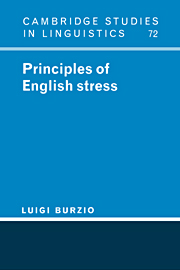Book contents
- Frontmatter
- Contents
- Preface
- 1 General introduction: overview and caveats
- PART I The stress of underived items
- PART II Stress and word-formation
- 6 Weak preservation
- 7 The range of stress-“placing” suffixes
- 8 Strong preservation
- 9 The range of neutral suffixes
- 10 Extensions and refinements
- References
- Subject index
- Index of names
- Index of languages
- Index of suffixes
8 - Strong preservation
Published online by Cambridge University Press: 20 August 2009
- Frontmatter
- Contents
- Preface
- 1 General introduction: overview and caveats
- PART I The stress of underived items
- PART II Stress and word-formation
- 6 Weak preservation
- 7 The range of stress-“placing” suffixes
- 8 Strong preservation
- 9 The range of neutral suffixes
- 10 Extensions and refinements
- References
- Subject index
- Index of names
- Index of languages
- Index of suffixes
Summary
Introduction
In this chapter and the next, we consider the phenomenon of stress neutrality, which we also refer to as “strong preservation.” Our task will be to revise the long-standing assumption, implemented in various ways, that the phenomenon in question is due to the ability of certain suffixes (and, more generally, affixes) to “evade” stress assignment. We will argue instead that strong preservation results from the same principle of stress preservation that we saw at work in chapter 6 (a reflex of metrical consistency (39) of 7.7), this time in conjunction with the second major indeterminacy of metrical structure – the one related to weak syllables. In contrast to weak preservation, which, as we saw, is made possible by the indeterminacy of the choice between (Lσ) and (σLσ) for word-internal feet, we will see that strong preservation is made possible by the ambiguity of weak syllables, namely by the availability of both …W) and …)W at the end of words. By thus linking stress neutrality of suffixes to the independent property of English of having weak syllables, we will correctly predict that stress neutrality of suffixes should be a language-specific property of English.
We begin by considering that, for a notable number of “stress-neutral” suffixes, neutrality is in fact not always true – a fact which is surprising if those suffixes have the ability to evade stress, but which will be quite consistent with our approach, as we will see.
- Type
- Chapter
- Information
- Principles of English Stress , pp. 229 - 254Publisher: Cambridge University PressPrint publication year: 1994
- 1
- Cited by



